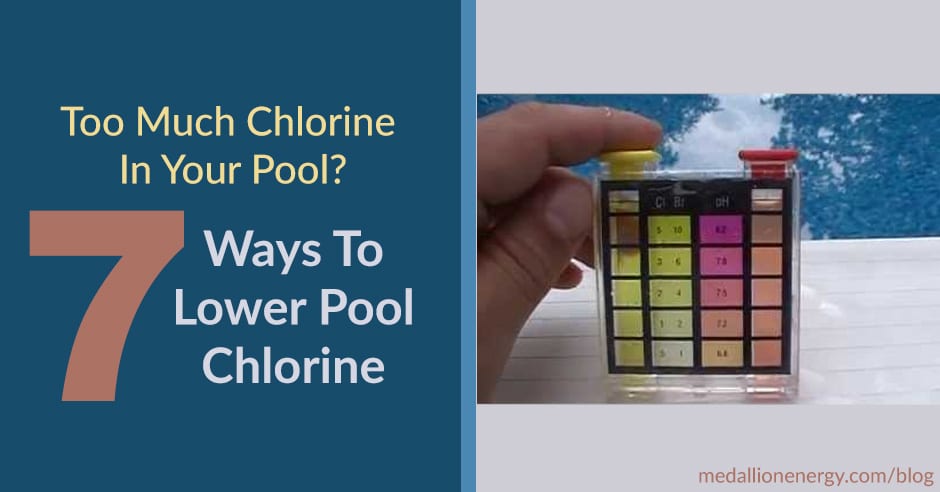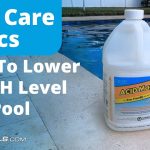Lowering chlorine levels in a pool can be achieved by using chemicals designed specifically for reducing chlorine concentration. In addition, dilution of pool water by adding fresh water can also help decrease chlorine levels.
Regular testing and monitoring of chlorine levels is essential for maintaining a safe and balanced pool environment.
Understanding Chlorine In Pools
Lowering chlorine levels in a pool requires careful understanding of the chemical balance. Learn effective techniques to reduce chlorine levels and maintain a safe swimming environment.
Understanding Chlorine in Pools Chlorine as a Pool Sanitizer Chlorine plays a crucial role in maintaining the hygiene and cleanliness of pool water by acting as a powerful sanitizer. It effectively eliminates harmful bacteria, viruses, and algae, ensuring that the water is safe for swimmers. Ideal Chlorine Levels in a Pool The ideal chlorine levels in a pool are essential for ensuring the water remains clean and safe. The recommended range for chlorine levels in a pool is 1 to 3 parts per million (ppm). This level effectively eliminates contaminants while remaining safe for swimmers. Regular testing and maintenance are necessary to keep the chlorine levels within this range. Methods to Lower Chlorine in a Pool When chlorine levels in a pool exceed the recommended range, it’s important to take steps to lower the levels without compromising the water quality. This can be achieved through methods such as dilution with fresh water, using chlorine neutralizers, and adjusting the pool’s pH levels. Regular maintenance and monitoring of chlorine levels are crucial for a safe and enjoyable swimming experience.
Credit: www.medallionenergy.com
Common Causes Of High Chlorine Levels
When it comes to maintaining a crystal-clear swimming pool, getting the right balance of chlorine is crucial. High chlorine levels can cause skin and eye irritation, strong chemical odors, and even damage to pool equipment. Understanding the common causes of elevated chlorine levels can help you take preventative measures and keep your pool safe and enjoyable for all swimmers.
Overdosing With Chlorine
Overdosing with chlorine often occurs when pool owners add too much chlorine to the water in an attempt to quickly rectify a low chlorine situation. This results in an overabundance of free chlorine in the pool, creating the potential for adverse effects on swimmers and pool infrastructure. It’s important to carefully measure and apply chlorine, following the manufacturer’s recommendations, to avoid inadvertently elevating chlorine levels.
Lack Of Dilution
Lack of proper dilution can lead to high chlorine levels, especially in smaller pools or those with inadequate water circulation. Without proper circulation and mixing, chlorine may remain in concentrated pockets, causing localized spikes in chlorine levels. Adequate water movement, regular brushing, and maintaining clean filters are key in preventing the buildup of chlorine concentration.
Methods To Lower Chlorine Levels
Methods to Lower Chlorine Levels Use of Chlorine NeutralizersUse Of Chlorine Neutralizers
Chlorine neutralizers are effective in reducing chlorine levels rapidly in your pool.
Increase Pool AerationIncrease Pool Aeration
Aerating your pool water helps to naturally lower the chlorine levels over time.
Natural Alternatives To Chlorine
Chlorine is commonly used to disinfect swimming pools and keep them free from harmful bacteria and microorganisms. However, some people may be sensitive to chlorine or simply prefer a more natural approach to pool maintenance. If you fall into either of these categories, there are several natural alternatives to chlorine that you can consider. In this article, we will explore two popular options: Saltwater Systems and Ozone Generators.
Saltwater Systems
Saltwater systems have gained popularity as a natural alternative to chlorinated pools. Despite the name, these systems do still utilize a small amount of chlorine, but at significantly lower levels compared to traditional chlorinated pools. Instead of adding chlorine directly to the pool, saltwater systems use a process called electrolysis to convert salt into chlorine. This provides a constant, controlled release of chlorine that helps keep the pool sanitized. The benefits of saltwater systems include reduced skin and eye irritation, as well as a softer feel to the water. Additionally, saltwater pools require less maintenance compared to traditional chlorine pools.
Ozone Generators
Ozone generators are another effective natural alternative to chlorine. These generators produce ozone gas, which is a powerful oxidizer that can effectively kill bacteria and other harmful organisms in the pool. Unlike chlorine, ozone does not leave behind any residual chemicals, making it a preferred choice for individuals with sensitive skin or those looking for a chlorine-free swimming experience. Ozone generators are generally installed alongside the pool’s filtration system and work by injecting ozone into the water as it passes through the filtration process. It’s important to note that ozone generators may require additional maintenance and monitoring to ensure optimal performance.
Maintaining Pool Balance
When it comes to maintaining a healthy and safe swimming pool environment, it’s essential to pay close attention to the balance of chlorine levels. Keeping chlorine levels within the recommended range is crucial for ensuring the water is clean and safe for swimming. To achieve this, regular testing and monitoring, as well as proper pool maintenance, play a vital role in maintaining the pool balance.
Regular Testing And Monitoring
Regular testing of chlorine levels is essential to ensure that the levels are within the recommended range. Utilize a reliable pool water testing kit to measure the chlorine levels in the pool water accurately. Test the water at least two to three times a week, especially during peak usage times. Make sure to also test for other chemical levels, such as pH and alkalinity, as these can impact chlorine effectiveness.
Proper Pool Maintenance
Ensure that the pool’s filtration system is functioning correctly to help maintain proper chlorine levels. Clean the pool filters regularly to prevent debris buildup that can affect chlorine distribution. Additionally, keep the pool water balanced by adding the right chemicals to adjust the pH and alkalinity levels as needed.
With these steps, you can maintain a well-balanced pool, ensuring the chlorine levels are optimal for a safe and enjoyable swimming experience.

Credit: www.wikihow.com
Preventing Chlorine Build-up
If you want to lower chlorine levels in your pool, try these effective methods to prevent chlorine build-up. Maintaining proper water balance, using chlorine neutralizers, and regularly monitoring chlorine levels are key to keeping your pool clean and safe for swimming.
Proper Chemical Storage
Store pool chemicals in a cool, dry place away from direct sunlight to prevent chlorine degradation.
Confirming Water Volume
Regularly check the pool volume to accurately measure and treat the water with appropriate chlorine levels.
Expert Tips For Crystal Clear Water
Regular pool shocking is an essential step toward maintaining crystal clear water. Shocking the pool helps to break down chloramines and organic contaminants, effectively lowering chlorine levels.
It is best to shock the pool at night to allow the chlorine to disperse and work without interference from sunlight. Following the manufacturer’s instructions is crucial for optimal results.
Optimal filtration is key to reducing chlorine levels. Be sure to run the pool filter long enough each day to keep the water clean and clear. Regularly clean and backwash the filter to maintain its efficiency and prevent the buildup of contaminants.

Credit: www.backyardpoolsuperstore.com
Conclusion
Having optimal pool chlorine levels is vital for a safe and enjoyable swim. By following these effective methods we discussed, you can easily lower chlorine in your pool. Remember to test your water regularly and make adjustments accordingly for a crystal-clear pool all season long.
Enjoy your swimming!




